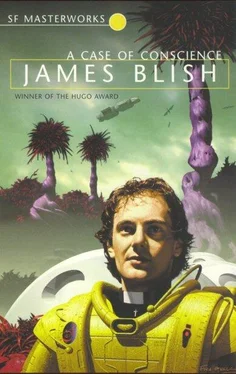Ruiz-Sanchez crossed himself automatically. Up on the wall, the Klee muttered in a low voice; it had not been off since Egtverchi’s broadcast.
“I don’t know whether I want to listen to that damn thing or not,” Michelis said sourly. Nevertheless, he turned up the volume. There was still essentially no news. The rioting was dying back, though it was as bad as ever in some shelters. The Smolensk announcement was duly made, bare of detail. Egtverchi had not yet been located, but UN officials expected a break in the case “shortly.”
“’Shortly,’ hell,” Michelis said. “They’ve run out of leads entirely. They thought they had him cold the next morning, when they found a trail to the hideaway where he’d arranged to tide himself over and direct things. But he wasn’t there—apparently he’d gotten out in a hurry, some time before. And nobody in his organization knows where he would go next—he was supposed to be there, and they’re thoroughly demoralized to be told that he’s not.”
“Which means that he’s on the run,” Ruiz-Sanchez suggested.
“Yes, I suppose that’s some consolation,” Michelis said. “But where could he run to, where he wouldn’t be recognized? And how would he run? He couldn’t just gallop naked through the streets, or take a public conveyance. It takes organization to ship something as outr?s that secretly—and Egtverchi’s organization is as baffled about it as the UN is.” He turned the 3-V off with a savage gesture.
Liu turned to Ruiz-Sanchez, her expression appalled beneath its weariness.
“Then it’s really not over after all?” she said hopelessly.
“Far from it,” Ruiz-Sanchez said. “But maybe the violent phase of it is over. If Egtverchi stays vanished for a few days more, I’ll conclude that he is dead. He couldn’t stay unsighted that long if he were still moving about. Of course his death won’t solve most of the major problems, but at least it would remove one sword from over our heads.”
Even that, he recognized silently, was wishful thinking. Besides, can you kill a hallucination?
“Well, I hope the UN has learned something,” Michelis said.
“There’s one thing you have to say for Egtverchi: he got the public to bring up all the unrest that’s been smoldering down under the concrete for all these years. And underneath all the apparent conformity, too. We’re going to have to do something about that now—maybe take sledgehammers in our hands and pound this damned Shelter system down into rubble and start over. It wouldn’t cost any more than rebuilding what’s already been destroyed. One thing’s certain: the UN won’t be able to smother a revolt of this size in slogans. They’ll have to do something.”
The Klee chimed.
“I won’t answer it,” Michelis said through gritted teeth. “I won’t answer it. I’ve had enough.”
“I think we’d better, Mike,” Liu said. “It might be news.”
“News!” Michelis said, like a swearword. But he allowed himself to be persuaded. Underneath all the weariness, Ruiz-Sanchez thought he could detect something like a return of warmth between the two, as though, during the three days, some depth had been sounded which they had never touched before. The slight sigh of something good astonished him. Was he beginning, like all demonolaters, to take pleasure in the prevalence of evil, or at least in the expectation of it?
The caller was the UN man. His face was very strange underneath his funny hat, and his head was cocked as if to catch the first word. Suddenly, blindingly, Ruiz-Sanchez saw the hat in the light of the attitude, and realized what it was: an elaborately disguised hearing aid. The UN man was deaf and, like most deaf people, ashamed of it. The rest of the apparatus was a decoy.
“Dr. Michelis, Dr. Meid, Dr. Ruiz,” he said. “I don’t know how to begin. Yes, I do. My deepest apologies for past rudeness. And past damn foolishness. We were wrong—my God, but we were wrong. It’s your turn now. We need you badly, if you feel like doing us a favor. I won’t blame you if you don’t.”
“No threats?” Michelis said, with unforgiving contempt.
“No, no threats. My apologies, please. No, this is purely a favor, requested by the Security Council.” His face twisted suddenly, and then was composed once more. “I volunteered to present the petition. We need you all, right away, on the Moon.”
“On the Moon! Why?”
“We’ve found Egtverchi.”
“Impossible,” Ruiz-Sanchez said, more sharply than he had intended. “He could never have gotten passage. Is he dead?”
“No, he’s not dead. And he’s not on the Moon, I didn’t mean to imply that.”
“Then where is he, in God’s name?”
“He’s on his way back to Lithia.”
The trip to the Moon, by ferry-rocket, was rough, hectic and long. As the sole space voyage now being made in which the Haertel overdrive could not be used—across so short a distance, a Haertel ship would have overshot the target—very little improvement in techniques had been made in the trip since the old von Braun days. It was only after they had been bundled off the rocket into the moonboat, for the slow, paddle-wheel-driven trip across the seas of dust to the Comte d’Averoigne’s observatory, that Ruiz-Sanchez managed to piece the whole story together.
Egtverchi had been found aboard the vessel that was shipping the final installment of equipment to Cleaver, when the ship was two days out. He was half-dead. In a final, desperate improvisation, he had had himself crated, addressed to Cleaver, marked “FRAGILE - RADIOACTIVE - THIS END UP,” and shipped via ordinary express into the spaceport. Even a normally raised Lithian would have been shaken up by this kind of treatment, and Egtverchi, in addition to being a spindling specimen of his race, had been on the run for many hours before being shipped.
The vessel, by no very great coincidence, was also carrying the pilot model of the Petard CirCon; the captain got the news back to the count on the first test, and the count passed it along to the UN by ordinary radio. Egtverchi was in irons now, but he was well and cheerful. Since it was impossible for the ship to turn back, the UN was now, in effect, doing his running for him, at a good many times the speed of light.
Ruiz-Sanchez found a trace of pity in his heart for the born exile, harried now like a wild animal, penned behind bars, on his way back to a fatherland for which no experience in his life had fitted him, whose very language he could not speak. But when the UN man began to question them all—what was needed was some knowledgeable estimate of what Egtverchi might do next—his pity did not survive his speculations. It was right and proper to pity children, but Ruiz-Sanchez was beginning to believe that adults generally deserve any misfortune that they get.
The impact of a creature like Egtverchi on the stable society of Lithia would be explosive. On Earth, at least, he had been a freak; on Lithia, he would soon be taken for another Lithian, however odd. And Earth had had centuries of experience with deranged and displaced messiahs like Egtverchi; such a thing had never happened before on Lithia. Egtverchi would infect that garden down to the roots, and remake it in his own image—transforming the planet into that hypothetical dangerous enemy against whose advent Cleaver had wanted to make it an arsenal!
Yet something like that had happened when Earth was a stable garden, too. Perhaps—O felix culpa!—it always happened that way, on every world.
Perhaps the Tree of the Knowledge of Good and Evil was like the Yggdrasil of the legends of Pope Hadrian’s birthland, with its roots in the floor of the universe, its branches bearing the planets—and whosoever would eat of its fruit might eat thereof…
Читать дальше











